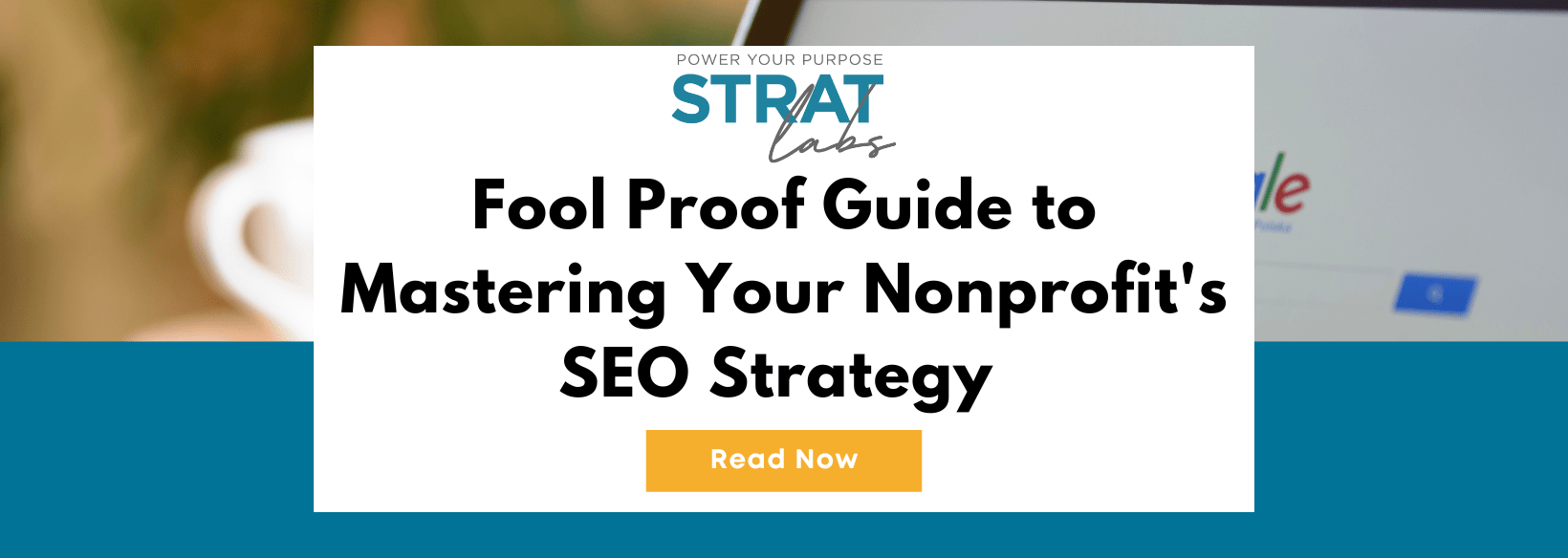
Fool Proof Guide to Mastering Your Nonprofit’s SEO Strategy
As a nonprofit, applying innovative digital marketing strategies to stand out and attract a broader audience of potential donors is critical. Search engine optimization (SEO) is considered a tried and true method to ensure Google supports and amplifies your mission.
Whether or not your organization has implemented SEO strategies, these tips will provide you with a solid foundation to bring your SEO strategy to the next level and help you drive more traffic.
Find & Implement Worthwhile Keywords
Before diving into new SEO strategies, invite your team to refresh and reassess your current keywords. Our society’s language is ever-changing, and it’s important to utilize the top words and phrases used within your industry, especially new terms that can help you build authority on search engines.
Use Google Trends To Perfect Your Keywords
We recommend reading your website and noting keywords that represent your organization best. Once you have solidified the main keywords you would like to use, you can plug them into Google Trends to see how they’ve been performing over time and whether or not they are the right choices for your strategy. Within Google AdWords, you can also explore “Search Queries,” which allows you to see what exact searches your potential donors are searching online.
Get Creative With Long-Tail Keywords
You may have already created informational website pages targeting your main keywords, and you’re wondering what to do next. At this point, you can create content targeted to rank for more secondary keywords, also known as long-tail keywords. These are longer, more specific keywords. Although they tend to have a lower search volume, they are easier to rank highly because there’s less competition from other websites.
For example, if your nonprofit focuses on making sports accessible to all, your website might target keywords such as “accessible sports” and “accessibility needs in sports.” With this strategy, you can create additional content targeting long-tail keywords such as “how to find accessible sports in [your city/state]” and “why accessibility is needed within the sports industry.” From there, you should start picking up more traffic from individuals searching for more specific questions or terms related to your organization
Implement SEO-Powered Content Strategies
Get Targeted With Blog Content
While writing from the heart can be a genuine approach to blog writing, Google doesn’t reward expressive writing or relatability in that way. When we are focusing on search engine optimization for blogs, it requires including a Google-approved checklist within your storytelling. While it might feel overwhelming to start, this will ensure that every blog written has a chance to stand out and rank.
Here are a few tips we recommend:
- Select 1-3 keywords for the blog to center around
- Repeat each keyword 1-4 additional times throughout the blog
- Craft content over 500 words
- Include external links to outside sites
- Include internal links to other pages on your website
Strengthen Your Expertise With Guest Blogs
Focusing on your nonprofit’s off-site SEO strategy is equally important to your on-site efforts. That’s because external links on other websites that point back to your website can help boost your website’s SEO rankings, this is known as backlinks. When you acquire backlinks from authoritative, trustworthy sites, search engines view your website as more authoritative as a result. One way to build a strong backlink profile for your website is to partner with other organizations and write guest posts for their nonprofit-focused blogs.
Here are a few tips we recommend:
- Before reaching out, be sure industry experts and advocates have strong web presences to maximize strategy
- Incorporating 5-6 guest blogs a year will help rank significantly
- Provide a theme and 1-3 keywords the guest writer should include
- Be sure to share guest blogs on social media
- Create a guest blog for their website as well
Implement SEO-Powered Website Strategies
Apply Strategic Internal Linking
As mentioned with blogs, including internal links, and hyperlinks that point to pages on the same domain, you can increase your search engine optimization. Internal links help Google find, index, and understand all of the pages on your site. If your organization uses them strategically, internal links can send page authority (or PageRank) to important pages. Internal linking is critical for any site that wants higher rankings in Google. This strategy focuses on using anchor text to help develop more internal links within your website that you can continue to link back to your most essential resources.
CHECK OUT SEM RUSH’S FULL GUIDE TO INTERNAL LINKING
Ensuring Website Accessibility
Website accessibility isn’t an all-or-nothing deal; it’s a spectrum on which your organization can advance its standing. As your nonprofit approaches this strategy, the main goal is to reach a higher conformance level. Conformance levels are defined in the Web Content Accessibility Guidelines (WCAG) and include levels A (the lowest level), AA, and AAA (the highest level). Even by making minor, incremental improvements to your accessibility, you can significantly enhance your user experience over time. For example, you can start by ensuring all your images have alternative text; your text has sufficient color contrast to the background and a website that a keyboard can navigate.
By taking note of these SEO strategies, your nonprofit will be better equipped to optimize your search engine ranking this year. SEO is no easy feat, and some nonprofits can find it worthwhile to bring in an SEO specialist to help develop and implement these SEO strategies. We hope this blog provides resources to get started.
If your team plans to tackle SEO strategies this year, continue to come back to our blog to find more resources!